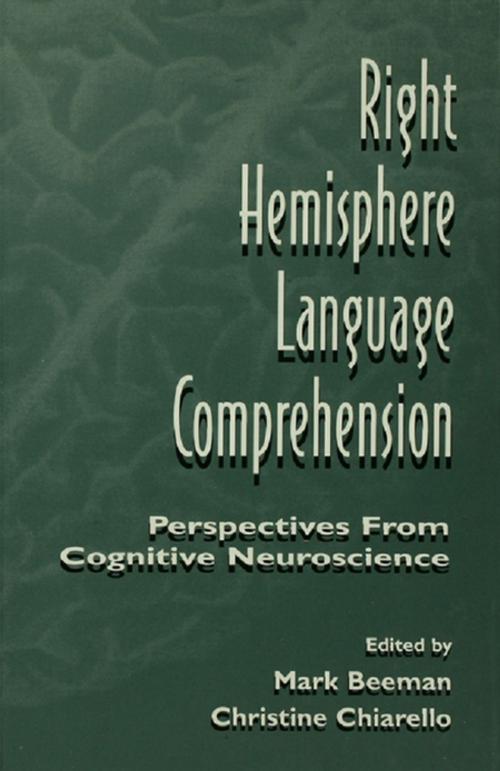Right Hemisphere Language Comprehension
Perspectives From Cognitive Neuroscience
Nonfiction, Health & Well Being, Psychology, Neuropsychology| Author: | ISBN: | 9781134794294 | |
| Publisher: | Taylor and Francis | Publication: | February 1, 2013 |
| Imprint: | Psychology Press | Language: | English |
| Author: | |
| ISBN: | 9781134794294 |
| Publisher: | Taylor and Francis |
| Publication: | February 1, 2013 |
| Imprint: | Psychology Press |
| Language: | English |
The statement, "The Right Hemisphere (RH) processes language"--while not exactly revolutionary--still provokes vigorous debate. It often elicits the argument that anything the RH does with language is not linguistic but "paralinguistic." The resistance to the notion of RH language processing persists despite the fact that even the earliest observers of Left Hemisphere (LH) language specialization posited some role for the RH in language processing, and evidence attesting to various RH language processes has steadily accrued for more than 30 years. In this volume, chapters pertain to a wide, but by no means, exhaustive set of language comprehension processes for which RH contributions have been demonstrated. The sections are organized around these processes, beginning with initial decoding of written or spoken input, proceeding through semantic processing of single words and sentences, up to comprehension of more complex discourse, as well as problem solving. The chapters assembled here should begin to melt this resistance to evidence of RH language processing.
This volume's main goal is to compile evidence about RH language function from a scattered literature. The editorial commentaries concluding each section highlight the relevance of these phenomena for psycholinguistic and neuropsychological theory, and discuss similarities and apparent discrepancies in the findings reported in individual chapters. In the final chapter, common themes that emerge from the enterprise of studying RH language and future challenge for the field are reviewed. Although all chapters focus only on "typical" laterality of right handed people, this work provides a representative sample of the current state of the art in RH language research.
Important features include:
* a wide range of coverage from speech perception and reading through complex discourse comprehension and problem-solving;
* research presented from both empirical and theoretical perspectives; and
* commentaries and conclusions integrating findings and theories across sub-domains, and speculating on future directions of the field.
The statement, "The Right Hemisphere (RH) processes language"--while not exactly revolutionary--still provokes vigorous debate. It often elicits the argument that anything the RH does with language is not linguistic but "paralinguistic." The resistance to the notion of RH language processing persists despite the fact that even the earliest observers of Left Hemisphere (LH) language specialization posited some role for the RH in language processing, and evidence attesting to various RH language processes has steadily accrued for more than 30 years. In this volume, chapters pertain to a wide, but by no means, exhaustive set of language comprehension processes for which RH contributions have been demonstrated. The sections are organized around these processes, beginning with initial decoding of written or spoken input, proceeding through semantic processing of single words and sentences, up to comprehension of more complex discourse, as well as problem solving. The chapters assembled here should begin to melt this resistance to evidence of RH language processing.
This volume's main goal is to compile evidence about RH language function from a scattered literature. The editorial commentaries concluding each section highlight the relevance of these phenomena for psycholinguistic and neuropsychological theory, and discuss similarities and apparent discrepancies in the findings reported in individual chapters. In the final chapter, common themes that emerge from the enterprise of studying RH language and future challenge for the field are reviewed. Although all chapters focus only on "typical" laterality of right handed people, this work provides a representative sample of the current state of the art in RH language research.
Important features include:
* a wide range of coverage from speech perception and reading through complex discourse comprehension and problem-solving;
* research presented from both empirical and theoretical perspectives; and
* commentaries and conclusions integrating findings and theories across sub-domains, and speculating on future directions of the field.















